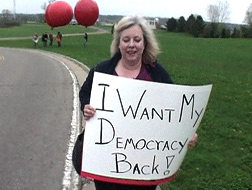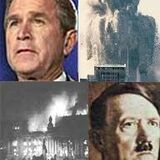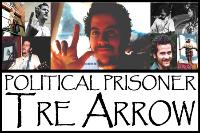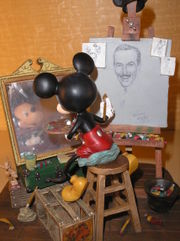Wednesday, December 27
Democracy Hacked, America Hijacked
 Watch below the film that industry-leader Diebold e-voting company tried to stop Americans from seeing before the November elections.
Watch below the film that industry-leader Diebold e-voting company tried to stop Americans from seeing before the November elections. Five days before the November 7 midterm elections HBO broadcast Hacking Democracy, a documentary featuring startling research by Bev Harris, an e-voting activist and writer from Kings County, Washington.
After vainly attempting to get answers to questions about computerized voting from her county election officials, she discovered on an FTP website unguarded proprietary code for voting machines owned by Diebold, the largest U.S. e-voting vendor. A subsequent analysis of that code by a Johns Hopkins University computer system analyst revealed significant vulnerabilities to Diebold voting machines, a discovery contradicting the company's assurances of the security of its voting machines.
Bev then became a fair elections advocate, starting the nonprofit organization BlackBoxVoting.org that effectively serves as an information clearinghouse on problems with computer voting from around the country. Harris also wrote Black Box Voting, a book of her work which can be downloaded at no charge at BBV.
Her work attracted the attention of HBO and Diebold, which threatened lawsuits to halt the film's production, its broadcast and to muzzle Harris. To its credit, HBO did not relent. In compiling evidence to make its case of vote manipulation, filmmakers established that both Democrats and Republicans have had elections stolen via computerized voting.
Recently posted in three segments to YouTube.com, Hacking Democracy, destined for an Oscar nod, is obligatory viewing for any American still harboring illusions the US is led by a President who was empowered by voters through a unbiased election.
Arguably, the most dramatic segment of the film appears in part 3. On 13 December 2005, Harris and a team of e-voting activists were invited by Ion Sancho, supervisor of elections for Leon County (Tallahassee) Florida, to demonstrate if any of his Diebold opti-scan voting machines could be hacked through its memory card, a scenario Diebold insists is impossible.
But see what magic Finnish computer analyst Harri Hursti can spin with a few strokes of the keyboard. In the process he clears up confusion Sancho harbored since the 2000 presidential election about Diebold machines in adjoining Volusia County that displayed 16,000 negative votes for Democrat presidential candidate Al Gore, who George Bush "defeated" by only 537 votes.
And as the cliche goes, the rest is history...very bad history.
Watch part 1 below or here (31 minutes, 57 seconds).
Watch part 2 below or here (28 minutes, 3 seconds).
Watch part 3 below or here (21 minutes, 57 seconds).











